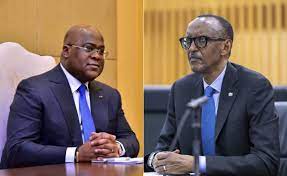With tensions mounting to an all-time high, the rhetoric from both Kigali and Kinshasa has hardened, but can this sabre-rattling lead to outright hostility between these two uneasy neighbours?
From trading accusations to exchanging threats of taking action against alleged acts of aggression that violate their sovereignty, words issuing from Rwanda and DR Congo have been strong and unmistakably combative.
Earlier this week, Rwanda fired a missile and hit a Congolese jet fighter it says has violated its airspace, the third time in as many months, while Kinshasa had issued a vow of its own that ‘this unprovoked act of aggression will not go unanswered’, heightening tensions to levels not witnessed between the two countries for decades.
Both countries say they are ready to militarily defend their sovereignty against aggression of any kind, leaving analysts chewing over what they see as the unlikely prospect of military confrontation.
Rwanda’s Minister of Foreign Affairs, Dr Vincent Biruta minced no words when he told parliament that the country’s sovereignty is inviolable.
“We have the will to do something, but we also have to be ready. We don’t know [what] the others are planning. If necessary, our security or sovereignty will be protected as it should be” he said.
“When they talk about Congo’s sovereignty, and say that its land should not be violated, it sounds like it’s the only country that has a territory that needs to be sovereign. When you want your territory to be respected, you ought to respect others too,” Biruta added.
“Rwanda’s sovereignty, the inviolability of its territory, has to be respected by everyone. And at the same time, we need to be ready, should it be necessary” e emphasised.
Some might put it the whole situation down to the poor personal chemistry between Kagame and Tshisekedi, the two making no secret of their mistrust about each other’s geopolitical intentions and designs in a region blighted by decades of instabilities, conflicts and genocides.
Mediators have realised that ironing out these two men’s differences could be decisive in restoring trust and confidence between the two neighbours and ending the recent conflict involving the M23 rebels which has displaced tens of thousands of people, mostly Congolese to become refugees in DR Congo and Rwanda.
A proposed mediation in Doha was called off after Tshisekedi withdrew at the last minute, prompting criticism from Rwanda that for the second time Congolese authorities have disrupted efforts by regional leaders to restore peace and stability in eastern DR Congo.
Tshisekedi said Congo has no faith in the talks, leaving regional peace brokers scrambling as they pick up the pieces from the latest failure to ease the tension.
Progress in reaching an accommodation after talks in Luanda, Angola in December has not shown encouraging signs as both sides continue to fire accusations and counter-accusations about backing each other’s rebel movements.
Despite denials form Kigali, DR Congo continue to maintain its allegations that Rwanda was actively giving material support to the M23.
But the government in Kigali in turn accuses the Congolese of ”trying hard” to drag Rwanda into its own conflict while also backing the FDLR rebels with arms in their stated objective of overthrowing President Kagame.
The Rwandan leader has blamed Tshisekedi for seeking to profit from the DR Congo imbroglio by trying to float the idea of postponing presidential election scheduled for December 2023.
The Congolese leader has condemned Kagame for this ”cynicism”.
However despite the combative rhetoric which culminated in a missile being fired on a fighter plane and a threat of retaliation, analysts believe that Rwanda and DR Congo have more to contend with domestically than spoiling for a fight both sides know would lead to disastrously costly implications.
M23 rebels, the catalysts for this whole scenario have overran much of the east of the Democratic Republic of Congo where they resurfaced in 2021, eight years after they were routed by the Congolese army in 2013.
The fact they had reemerged from none other than neighbouring Rwanda to launch penetrating runs into eastern DRC, triggered suspicion in Kinshasa about Rwandan involvement in the planning and staging of such attacks which had overrun regular Congolese army units since June 2022.
For now all that analysts see happening is more tension and perhaps incidents like the one which happened when a Congolese fighter jet flew over Rwanda but no full scale mobilisation for a conflict between neighbours who have more to worry about domestically.
WN/as/APA


